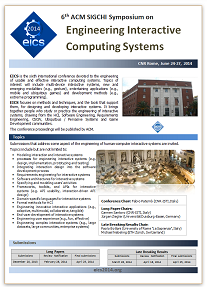|
The sixth ACM SIGCHI Symposium on
Engineering Interactive
Computing Systems
CNR Rome, Italy, June 17-20, 2014
|
Keynotes
Making the Web More Inclusive With Adaptive User Interfaces
Krzysztof Z. Gajos
Harvard University
http://www.eecs.harvard.edu/~kgajos/
Abstract
I build user interface that adapt their structure, appearance and behavior to the goals, abilities, preferences and cultural norms of their users. Prior work in adaptive user interface community has demonstrated that adaptive and adaptable interfaces can improve users' performance and satisfaction. These findings alone should make adaptation a core component of the user interface design practice. But I argue that adaptive interactive systems are even more fundamentally important: they help overcome implicit biases built into most interfaces and they are a scalable approach for democratizing access to digital resources. To convince you of it, I will first present several examples of situations in which the typical one-size-fits-all user interfaces can be a source of unintended, but systematic discrimination causing some groups to be less likely than others to take advantage of a digital resource in the first place, or causing them to have a less efficient or substantially different experience compared to their peers. I will then present examples of several adaptive user interfaces that successfully provided more equitable experiences to broader populations compared to traditional non-adaptive designs. I will conclude by reflecting on the major challenges that stand in the way of broad adoption of adaptive techniques in practice. In particular, I will highlight the mismatch between the abstractions needed to develop effective adaptive user interfaces and the current software engineering practice.
The slides are available for download in PDF format.
Mindless or Mindful Technology?
Yvonne Rogers
University College London
http://www.ucl.ac.uk/uclic/people/y_rogers
Abstract
We are increasingly living in our digital bubbles.
Even when physically together – as families and friends in our living rooms, outdoors and public places – we have our eyes glued to our own phones, tablets and laptops.
The new generation of ‘all about me’ health and fitness gadgets, that is becoming more mainstream, is making it worse.
Do we really need smart shoes that tell us when we are being lazy and glasses that tell us what we can and cannot eat? Is this what we want from technology – ever more forms of digital narcissism, virtual nagging and data addiction?
In contrast, I argue for a radical rethink of our relationship with future digital technologies.
One that inspires us, through shared devices, tools and data, to be more creative, playful and thoughtful of each other and our surrounding environments.
The slides are available for download in PDF format.
|



 Association for Computer Machinery
Association for Computer Machinery
 ACM SIGCHI - Special Interest Group in Computer-Human Interaction
ACM SIGCHI - Special Interest Group in Computer-Human Interaction


